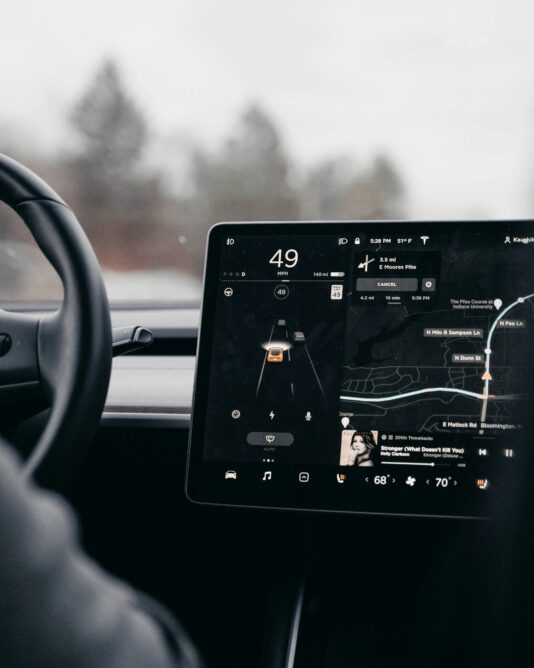The Future of the Automotive Industry: When Cars Become Software Services
June 23, 2025
The cars of the future are no longer just about engines and design — they are about software, data, and user experience. This places entirely new demands on car manufacturers and creates new expectations among consumers.
The car is no longer just a vehicle
Technological advancements in artificial intelligence and digitalization are fundamentally changing how we live, work, and interact with the world around us. Companies worldwide are developing new ways to leverage this resource to create smarter, more personalized, and more efficient solutions. This shift is clearly visible in the automotive industry — particularly in China — which has entered a new era where cars are no longer just transportation tools moving us from point A to point B, but intelligent data platforms.
According to Bill Russo, one of the leading experts on China’s automotive industry, Chinese manufacturers now view the car as a kind of “smartphone on wheels” — a platform that collects data and delivers tailored services to the user. In this way, revenue is generated not only from the sale of the car but also from the services provided after purchase, such as:
- Insurance adjusted to your driving patterns
- Personalized maintenance based on vehicle data
- Navigation optimized for real-time traffic and your driving habits
- Entertainment systems tailored to your preferences
- Voice-controlled assistants that learn your routines
- Software updates that continuously improve user experience and add new features
- Energy management for electric vehicles that adapts charging to your driving needs
- Safety features that proactively alert you to potential hazards using real-time data
- Advanced autonomous driving technology that not only assists but can drive the car itself
We are seeing a clear shift away from traditional hardware focus toward data and software. It is often said that “data is the new oil,” and this is especially true in China’s automotive industry — where data has become the raw material powering innovation. While European carmakers still emphasize horsepower, driving dynamics, and comfort, their Chinese counterparts are leading in the development of data, automation, and intelligent services.
New data shows that many Danes are embracing in-car data sharing
In Denmark, there has been public debate about whether Chinese electric vehicles pose a potential security risk — with particular concern over surveillance and data misuse. The worry is that the many sensors and extensive data collection in these cars could be used to track movements, monitor critical locations, or collect sensitive information. Discussions have especially focused on whether Chinese EVs should be restricted near military bases, government buildings, or other areas where data security and national infrastructure are particularly vulnerable.
Yet, a new survey from Epinion shows that 44% of Danes do not see it as a problem that data from modern cars is shared with, for example, the manufacturer. This suggests a growing acceptance of modern vehicle data collection as a trade-off for the benefits that these high-tech cars provide.
When looking at what concerns Danes the most, the survey shows the highest skepticism relates to:
- Connected devices (smartphones via Bluetooth/Wi-Fi, contact sharing)
- Location and routes (GPS tracking, driving history)
- Camera and sensor recordings (interior/exterior footage, dashcams)
The results also reveal that only 5% of car buyers consider the country of manufacture a key factor in their purchase decision.
This challenges the previous perception that Danish consumers actively avoid Chinese cars due to surveillance fears. Danes appear to welcome innovation — as long as it does not unnecessarily compromise privacy.
The auto industry at a crossroads
Digital transformation is forcing European automakers to rethink their focus. While traditional engineering and engine performance have long been the cornerstones of the industry, the future is now driven by software, data, and user experiences. To remain competitive, cars must not only be safe and comfortable but also deliver a digital experience that meets the expectations and needs of modern consumers.
This raises an important question for Europe’s carmakers: Should they adopt elements of the Chinese approach to avoid falling behind?
The Chinese model, however, raises important concerns about data security and trust. On the one hand, China demonstrates how advanced data and technology platforms can reshape the automotive industry and create new business opportunities. On the other hand, this rapid development has been accompanied by challenges related to data security and transparency, raising questions about trust and consumer protection.
Europe should learn from China’s innovation while upholding strong data ethics. The right path for European automakers is to integrate digital technologies while maintaining a strong focus on data security, transparency, ethical practices, and accountability. These are the values that will earn consumer trust in an increasingly digital world.
Thus, the European automotive industry has a unique opportunity: to combine the best of China’s technological advances with Europe’s high standards for data protection and ethics.
Would you like to learn more about how Epinion supports players in e-mobility and the automotive industry with data analysis and strategic advice? Get in touch with us to find out more.








